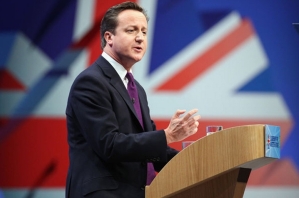
Leaders of various religions are speaking in defense of David Cameron, who recently came under fire for claiming that Britain is a "Christian country."
Shortly before Easter, the British Prime minister urged Christians to be "more evangelical" about their faith and to "get out there and make a difference to people's lives."
"I have felt at first hand the healing power of the Church's pastoral care, and my children benefit from the work of a superb team in an excellent Church of England school," Cameron stated.
Although he clarified that Britain being a "Christian country" did not mean "doing down" other religions or "passing judgment" on individuals with no faith, many notable British scientists, authors and intellectuals were quick to object, saying that Cameron's assertions created "alienation and division in our society."
"Apart from in the narrow constitutional sense that we continue to have an established Church, Britain is not a 'Christian country.' Repeated surveys, polls and studies show that most of us as individuals are not Christian in our beliefs or our religious identities," they wrote in a letter to the Daily Telegraph. "...We are a largely non-religious society."
However, BBC News reports that religious leaders are defending Cameron, saying the UK has "historically" and "culturally" been a Christian country since its formation.
Anil Bhanot, managing director of Hindu Council UK, said he was "very comfortable" with the UK being defined as a Christian country, stating that many Hindu people celebrated Christmas and Easter.
"People can secularise those traditions but it doesn't take away from the fact that the country was based in Christian traditions," he said.
Christina Rees, a member of the General Synod, the highest governing body of the Church of England, said she was impressed Cameron had the "confidence" to talk about his faith.
In addition, Muslim Council of Britain secretary general Farooq Murad said the UK was undeniably a Christian country, and had"deep historical and structural links" to Christianity.
"A sense of the sacred is to be cherished", he said, asserting he believed the UK would be a stronger country if it practiced "recognising and celebrating" people with and without religion "living in harmony".
This is not the first time the British Prime minister has been vocal about his faith; last week he called on his country to fight global persecution of Christians and other religious groups.
"I hope we can do more to raise the profile of the persecution of Christians around the world," Cameron said at his Easter reception at Downing Street. "It is the case today that our religion is now the most persecuted religion around the world. I think Britain can play a leading role in this."
A Downing Street spokeswoman says Cameron despite his Christian faith, the Prime Minister does not discriminate against other religions.
"He has said on many occasions that he is incredibly proud that Britain is home to many different faith communities, who do so much to make the UK a stronger country," she stated.
According to the CIA World Factbook, based on 2011 statistics, Christians make up around 59.5 percent of the U.K. population. Those with no religion make up 25.7 percent of the population.







